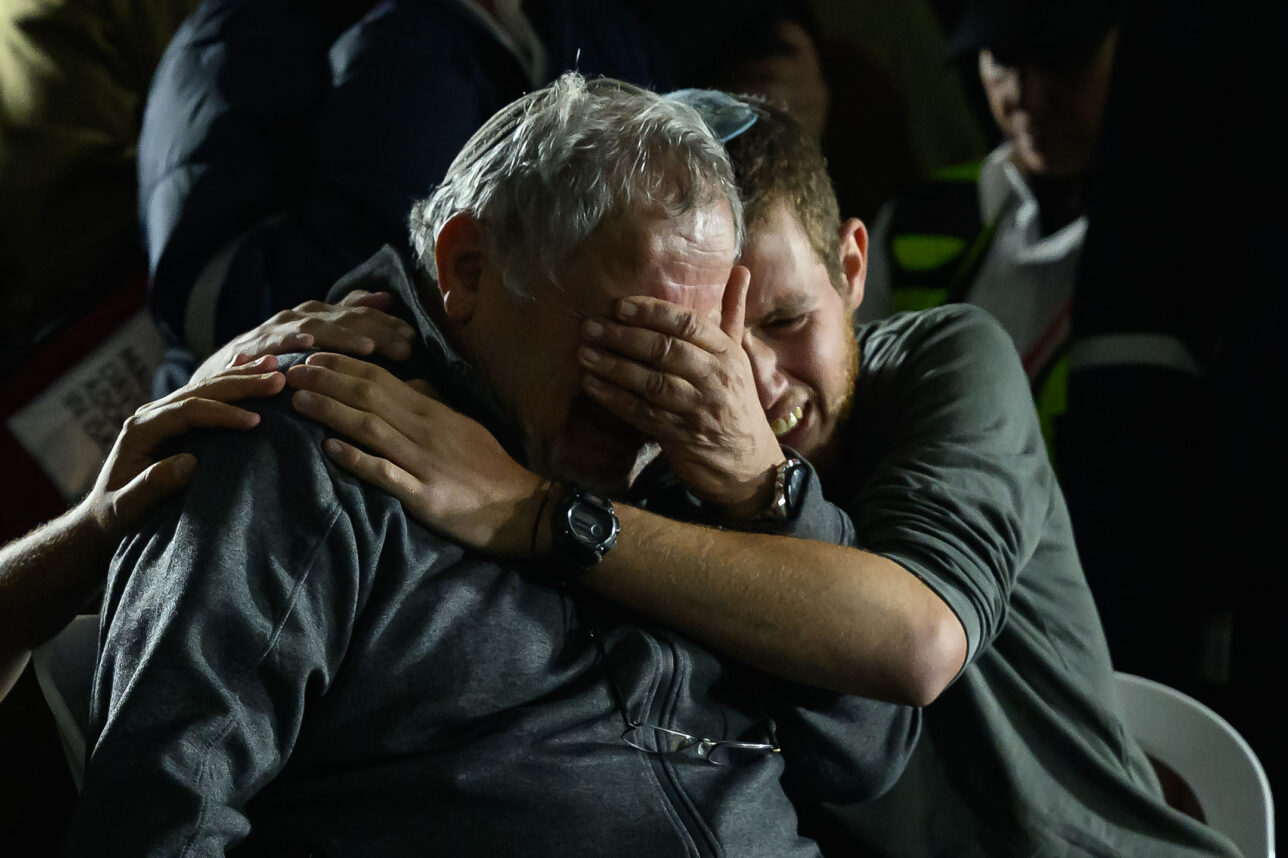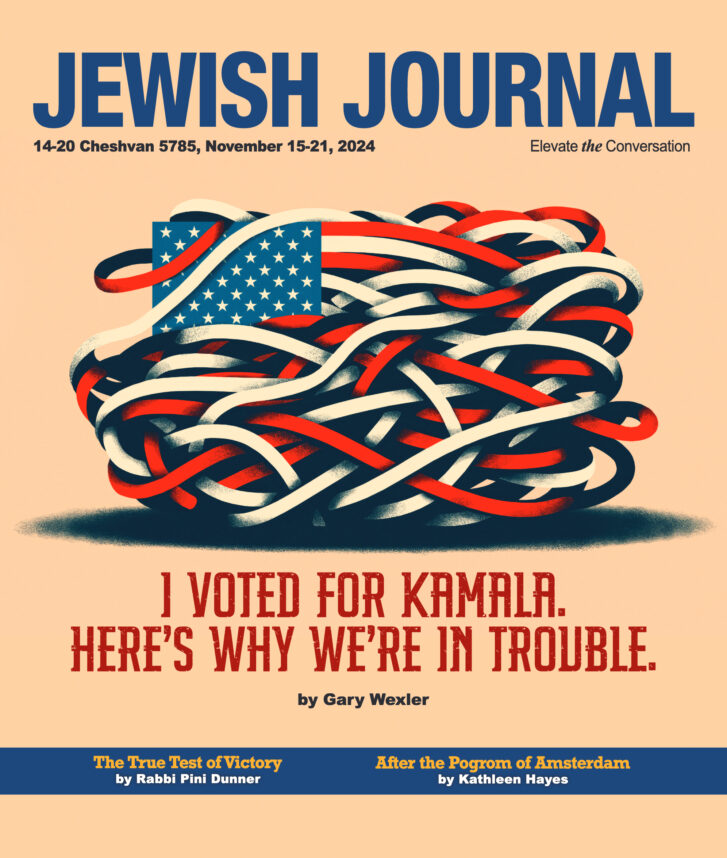
Measure R, which will be on Los Angeles County voters’ ballots in the March 3 election, is a proposal to expand the powers of the Sheriff’s Civilian Oversight Commission. What follows is a point-counterpoint on the measure by Benjamin Kersten and Larry Greenfield.
VOTE YES
By Benjamin Kersten
“Liar! You tell our children of freedom / while day and night you lock them in chains and cells.” These lines come from a 1931 Yiddish poem titled “Scottsboro” by Betsalel Friedman (born 1897, Brisk-Litovsk, Belarus; died 1941, New York), written to advocate for nine young African American men who were unjustly incarcerated in Alabama. Friedman immigrated to New York in 1922 and taught at the Workmen’s Circle and Yiddish schools. He was active in the International Workers Order, which focused on cultural awareness, anti-fascist activities and supporting the rights of African Americans.
Friedman’s words continue to resonate, particularly in Los Angeles County, home to the largest jail system in the United States. L.A. County incarcerates massive numbers of people rather than seek sustainable, care-based solutions for those experiencing mental health issues, drug dependency and homelessness. Friedman points out the hypocrisy of the United States’ founding mythology of equal opportunity and calls us to identify the places where the promise of freedom rings hollow, as when people are sent to jail instead of being provided with the resources necessary for them to live as they choose.
At Bend the Arc, a progressive Jewish social justice nonprofit, we know that we must join the fight to oppose violent policies and institutions that continue to fracture our communities. Like Friedman, we lend our voices to liberation, and so we write now in support of Measure R, that will pave the way for L.A. County to hold the Sheriff’s Department accountable, reduce recidivism, prevent crime and redirect resources to social services.
Powered by Black Lives Matter, community organizations and citizens working at the grass-roots level, the movement that put Measure R on the ballot extends an invitation to foster compassion instead of relying on cages. Measure R will grant subpoena power to the Sheriff’s Civilian Oversight Commission, enabling it to more effectively investigate the corruption that plagues the Sheriff’s Department, including cases of a deputy trafficking drugs, a deputy raping female inmates, continual mistreatment of inmates and the death of inmates who allegedly were under careful supervision. With subpoena power, the Civilian Oversight Commission can better improve transparency and accountability. Subpoena power will enable the commission to procure witness testimony and full evidence when investigating misconduct. Subpoena power, in other words, is a tool that the commission requires in order to do the job it has been tasked to do.
Secondly, Measure R advocates for alternatives to incarceration. A commission will develop a Comprehensive Public Safety Reinvestment Plan and Feasibility Study to reduce jail populations and redirect savings to services such as youth programs, public education and housing. These are the steps necessary to decenter incarceration in a society that continues to overwhelmingly punish people of color, people with mental illness, drug users and people experiencing homelessness.
At Bend the Arc, we understand the importance of standing together to build a more just society. We see how institutions such as jails rip apart families, subject many of those around us to ruthless living conditions devoid of adequate safety and health care and encourage us to view ills in our society through a lens of criminality. As Jews, we know that ideas of criminality get attached to people who fall outside of the national ideal along axes of race, class, gender, sexuality and ability rather than to the state institutions that deem some lives less worthy than others.
Our heritage is filled with courageous individuals who organized with their neighbors to fight lynching, to call for better working conditions and to build a society that would treat all people with dignity and respect. At various points in our history, it has been difficult to imagine a society without slavery, without lynching or without legal segregation. Although we have addressed some of these problems formally thanks to leaders like Ida B. Wells, white supremacy endures. As thinkers like Angela Davis and Colin Dayan have shown, white supremacy, and the legacy of slavery in particular, manifest in a system of punishment that camouflages its racist dimensions with the language of criminality. The Civilian Oversight Commission’s plan will go beyond thinking about how to merely improve the prison system and lay the groundwork for a future that prioritizes care over incarceration.
Today, we see people from communities of color and poor communities tracked toward jail, which has proven ineffective in addressing crime and is staggeringly expensive: California has persistently high recidivism rates, but when we invest in things like housing, 86% of people stay out of jail. Accordingly, we support an initiative that would uplift all of us precisely by helping those most in need. Friedman and other poets who were associated with left-wing groups in the 1930s fought against racism and xenophobia, violent political regimes and war with a vigor that should inspire all of us to have conversations with loved ones, march in a crowd, write a poem and vote Yes on R in March.
Voting Yes on R moves our society a step closer to decarceration. It will help prevent the expansion of jail populations and advocate for housing, mental health services and greater access to drug programs. Community-based alternatives to incarceration help keep people safe. In addition to bringing about much needed change locally, a substantial reform in the L.A. County jail system could pave the way for further reform around the country. Because the jail system here is the largest — and supremely broken — a reduction in incarceration and redirection of funds toward social services in L.A. will demonstrate that such changes also can take place elsewhere. Voting Yes on R is fundamentally a vote for care instead of cages and an expression of hope for a better world.
VOTE NO
By Larry Greenfield
Jewish Tradition balances important principles of justice, including protecting communal security on the one hand, and caring for all of God’s creation, even criminal perpetrators, on the other.
A tradition of laws, Judaism teaches through detailed legal codes that citizens must act to avoid harm to other individuals, and to seek penance, for violations, including repair of serious harm caused.
Punishment is part of the Jewish tradition, promoting deterrence and retribution. So, too, opportunities must be given for perpetrators to be welcomed back into the community after appropriate rehabilitation and restitution to victims.
In the United States, there have been two long-standing “movements” related to the urban criminal justice system, both of which have merit.
First, the Victims’ Rights Movement, which grew out of the civil rights era in part to respond to women seeking prosecution of fathers who did not pay child support.
A U.S. presidential task force and congressional and state laws developed many important policies that seek to care for victims and honor their surviving families, including witness protection and the right to privacy.
California voters, too, have passed two major modern Victims’ Bill of Rights laws. Proposition 8 (1982), which prioritizes public safety in the setting of bail, and Proposition 9 (2008), Marsy’s Law, which establishes that victims are entitled to legal case information, to be heard at criminal justice proceedings, and to financial recompense for losses suffered as a result of a crime.
Californians also have imposed mandatory minimum sentences for violent criminals and three-strikes laws and other measures to increase liability and enhance sentencing in order to protect the public.
Voters also passed Megan’s Law (1996), which mandates the California Department of Justice to notify the public about specified registered sex offenders.
Second, the Criminal Justice Reform Movement, frequently a bipartisan coalition of taxpayer advocates, religious leaders and community activists, all seek to reduce the financial costs of our public and private prison industry and its unions, and to encourage efforts to reduce recidivism among the prisoner population upon eventual release from incarceration.
In 2014, California voters passed Proposition 47, which converted many nonviolent offenses, such as drug and property offenses, from felonies to misdemeanors and freed thousands of criminals from state prison.
Critics of this law suggest it is now more difficult to move drug offenders into treatment programs without the threat of incarceration. Los Angeles Mayor Eric Garcetti and many others have blamed Prop. 47 for subsequent increasing crime rates.
At the federal level, in 2018, pleasing conservatives and liberals, President Donald Trump’s administration signed the First Step Act (2018), which finally offers long-sought meaningful sentencing reforms to reduce the prison population, especially for nonviolent drug offenders.
This major legislation builds on previous efforts rooted in the faith-based community to promote the moral and practical education of prisoners, preparing them for parole and release.
Unfortunately, the advocates of Measure R don’t advocate for criminal responsibility or for more crime victims’ rights. Instead, they offer rhetoric, which characterizes perpetrators as victims in support of a political agenda.
Measure R has two main sections which purport to respond to community concern over deputy-involved shootings or other law enforcement incidents.
1) The measure calls for the public release of protected “personnel” information that L.A. County Sheriff Alex Villanueva maintains cannot be released as a matter of employment privacy law.
Recently, the L.A. Board of Supervisors gave the Sheriff’s Civilian Oversight Commission subpoena power. Measure R makes that power permanent, and not subject to a reversal due to department political change.
But, the sheriff has explained he already has ordered all records to be placed online, except for confidential personnel records, victim and witness information on certain crimes and information on active criminal or administrative investigations.
The measure is merely setting up expensive lawsuits. “No matter if you have a subpoena or not, (some information requests) are not going to be honored,” Villanueva said. “Taxpayers are going to foot the bill. I guess it’s good job security for attorneys.”
2) The measure also calls for a study on alternatives to jail construction and incarceration, calling for a diversion of funds to county agencies and community organizations.
But, again, the Sheriff’s Department and the County Probation Department already are working on plans to reduce the county’s jails by 1,000 beds, after the Board of Supervisors canceled a $1.7 billion contract to replace the Men’s Central Jail with a mental health treatment program. The cancellation, Villanueva said, cost an $80 million penalty to taxpayers.
“Even if they come up with a plan, we’ll say, ‘Great,’ ” Villanueva said. “The county has no legal obligation to do anything with their plan. The whole point is to make people feel better to make them feel they are pushing their agenda.”
Furthermore, the L.A. County Office of Diversion and Reentry (ODR), created in 2015, has as its mission to develop and implement countywide criminal justice diversion for persons with mental and/or substance use disorders, and to provide reentry support services based on individual need, especially to reduce youth involvement with the justice system.
The advocates of Measure R therefore fail on three levels.
They fail to express sensitivity to the broad range of our Jewish tradition’s values and they selectively put their thumb on the scale of justice in advocacy of only one side of the criminal justice equation.
They fail to respect the existing robust federal and state criminal justice policy record and voter history, which balances not only the interests of the accused and the incarcerated but also their victims and public safety as well.
And finally Measure R proponents are simply virtue signaling, inviting lawsuits over protected information and promoting a public campaign to achieve goals already being pursued through the county law enforcement and judicial system.
Benjamin Kersten Responds:
The Torah does not normally include incarceration as a method of punishment in its judicial system. When biblical characters do end up in prison, in the cases of Joseph and the prophets Jeremiah and Micaiah, the Torah clearly supports the prisoners. We cannot turn to the Torah or the Talmud to understand the Los Angeles County jail system, but it does teach us to be concerned with the dignity of humanity. Current jail conditions prevent inmates, over 60% of whom experience mental health issues, from living with dignity. Moreover, jails weaken our community rather than strengthen them because of a lack of accountability. Voting Yes on R begins to fix these problems.
The prison industrial complex, which includes the jail system, maintains the authority of people with proximity to racial and economic privilege while labeling people of color, poor people, immigrants and others as criminals. Los Angeles has no doubt made progress, for instance by creating an Office of Diversion and Reentry. The L.A. County Board of Supervisors has thus shown that they have it within their power to help our communities by addressing people with needs that cannot be addressed in cages.
In order to keep improving our society, we need accountability and, in turn, the Civilian Oversight Commission needs subpoena power. The Civilian Oversight Commission is the only external body that the Sheriff’s Department must answer to, but they must be able to access records and compel testimony from agency officials in order to do their job. Villanueva has built a wall of secrecy around the department through actions like curtailing the inspector general’s ability to access records and scaling back background checks for incoming deputies. It is no surprise that he would balk at the idea of answering to the people. At the end of the day, this is about keeping people safe.
The study for reducing the jail population that would result from Measure R will focus more on public needs than past efforts. The Mental Health Treatment Center that was canceled was simply a jail by another name, especially because it positioned health services under the purview of the criminal legal system. The contract signed with McCarthy Building Companies Inc. would have repurposed the site of the Men’s Central Jail, creating a centralized site that would have isolated people from their support systems. While Villanueva unsurprisingly called the cancellation expensive, it is in fact the jail system that costs taxpayers money. In 2017, the Sheriff’s Department spent $798 million, or 24% of its $3.32 billion budget on jail — money that would be better spent on alternatives to imprisonment. Support for Measure R is not about rhetoric but rather a challenge to think about sustainable, community-based solutions to economic, social, and political problems.
Larry Greenfield Responds:
“Justice, justice, shalt thou pursue, so that you may live.” (Deuteronomy 16:20).
Measure R rejects the wisdom of our tradition, which seeks balance between community safety and reasonable care for prisoners.
Polls repeatedly have shown that Americans overestimate the number of prisoners in the United States who are incarcerated for nonviolent drug offenses.
The real number of nonviolent offenders is 20%. Some 40% of prisoners have committed violent crimes like murder, robbery or assault, for whom the public does not favor early release.
Liberals and conservatives generally agree on making room for more violent prisoners but California’s political leadership has not invested in new prisons for decades, and the county also recently has rejected building additional beds as well.
In response to “overcrowding” in the California prison system, the U.S. Supreme Court, in 2011, ordered California to reduce its incarcerated population. But instead of building more state prisons, former Gov. Jerry Brown’s response was a policy of “realignment,” which pushed ever more responsibility for incarceration onto the county jail system.
Along with Proposition 47 (2014), which gave thousands of state prisoners early release, three other factors have increased our urban crime and disorder.
State and local “sanctuary” policies for undocumented immigrants, the rise of homelessness because of attractive weather and lenient policing of tent cities, and a culture of increased permissiveness of drug use have contributed to a deteriorating urban environment in downtown Los Angeles, San Francisco and elsewhere.
Overwhelmed, the county offers drug treatment and diversion programs, especially for nonviolent, first-time youthful drug offenders.
Instead of offering support to already extremely liberal public policy, Measure R’s advocates pile on with an ever more radical agenda, revealed by their calling jails “cages” and their rhetoric against “racial privilege.” This is reminiscent of New York City, where police officers feel targeted by Mayor Bill de Blasio’s campaign of demonization.
L.A. County counsel Mary Wickham says: “The Office of the Inspector General (OIG) believes the current investigative model works well, making the initiative unnecessary. … Collaboration between the OIG and Civilian Oversight Commission (as well as the Los Angeles Sheriff’s Department) has been instrumental in effectuating reform in such areas as body cameras, compliance with the Prison Rape Elimination Act and identification of secret societies within the Los Angeles Sheriff’s Department.”
Nuanced public policy is not advanced by a campaign of signature gathering that then thrusts upon the voters little understood public policy, resulting in more lawsuits, not more justice.
Our elected officials have failed to prevent mass homelessness, an affordable housing crisis, middle-class flight and increasing risks of public health challenges. California ranks at the bottom in public education and business climate. Our law enforcement and judicial systems already are overwhelmed. Where is the accountability for all of that?
Measure R is an ideological stunt, not a thoughtful policy solution to jail overcrowding, a growing crime wave and the rapid decline of our county’s public health and welfare.
Larry Greenfield is a Fellow of The Claremont Institute for the Study of Statesmanship & Political Philosophy. Benjamin Kersten is a doctoral student in UCLA’s Department of Art History, where he studies modern art and Jewish politics. He organizes with Bend the Arc: Jewish Action around criminal justice.





















 More news and opinions than at a Shabbat dinner, right in your inbox.
More news and opinions than at a Shabbat dinner, right in your inbox.